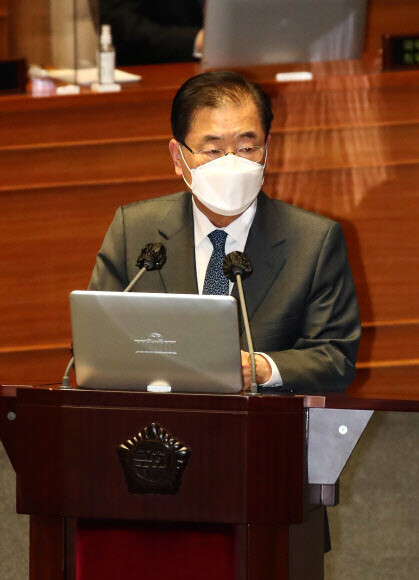hankyoreh
Links to other country sites 다른 나라 사이트 링크
S. Korea won’t oppose ocean release of Fukushima water if Japan abides by IAEA standards, foreign minister says

Following Japan’s decision to discharge radioactive water from its Fukushima nuclear power plant into the ocean, South Korean Foreign Minister Chung Eui-yong said Monday that South Korea would have no reason to oppose the plan as long as Japan meets three conditions about information sharing and follows the standards of the International Atomic Energy Agency (IAEA).
Chung made the remarks after Moon Jin-seog, a lawmaker with the Democratic Party, asked him in an interpellation session Monday at the National Assembly whether the government remained opposed to Japan’s decision to discharge the contaminated water.
“It’s not so much opposition, as that we’ve consistently and repeatedly asked Japan for three things while prioritizing the health and safety of the Korean public,” Chung said in response.
Chung’s three conditions are for Japan to provide sufficient information and scientific grounds about releasing the contaminated water, engage in adequate preliminary deliberations with the South Korean government, and guarantee that South Korean experts will be part of the IAEA’s inspection process.
Chung’s remarks suggest that South Korea is currently opposed to Japan’s plan because it hasn’t been provided with enough information and lacks the grounds to ascertain whether it’s safe to release the contaminated water.
Chung was also asked whether Seoul has any plans to take action in concert with the governments of China, Russia, and Taiwan, which have also objected to Japan’s decision to release the water. “We’re mostly in consultation with countries that border the Pacific Ocean. There are also 16 island countries that have expressed the same position as [Japan’s] five neighbors [one of which is South Korea].”
“The US agrees with us on the basic principle that the IAEA must be allowed to determine the appropriateness of the Japanese government’s plan to discharge the contaminated water. But since the statement that the Americans released shortly after Japan’s decision differs considerably from our government’s conclusions, we’re currently making our position clear to the Americans through a number of channels.”
In addition, Chung addressed the possibility of filing a complaint with the International Tribunal for the Law of the Sea, which President Moon Jae-in earlier mentioned. “We’re looking into several viable countermeasures, including action in the courts.”
In a meeting at the Blue House Wednesday, Moon ordered officials to “actively explore” the option of appealing Japan’s decision to the International Tribunal for the Law of the Sea, along with other “provisional measures.”
Koichi Aiboshi, Japan’s ambassador to South Korea, spoke positively Monday about the idea of including a South Korean expert on the IAEA panel that will inspect Japan’s discharge of contaminated water from the Fukushima plant.
Aiboshi fielded a related question from reporters at the close of the opening ceremony for a photography exhibition in downtown Seoul celebrating the 10th anniversary of the Trilateral Cooperation Secretariat, which represents South Korea, China, and Japan.
“That’s what we’re thinking, but it’s something for the IAEA and South Korea to discuss,” Aiboshi said.
The IAEA has also spoken in favor of including a South Korean expert on the panel of inspectors.
By Kim Ji-eun, staff reporter
Please direct comments or questions to [english@hani.co.kr]

Editorial・opinion
![[Column] Has Korea, too, crossed the Rubicon on China? [Column] Has Korea, too, crossed the Rubicon on China?](https://flexible.img.hani.co.kr/flexible/normal/500/300/imgdb/original/2024/0419/9317135153409185.jpg) [Column] Has Korea, too, crossed the Rubicon on China?
[Column] Has Korea, too, crossed the Rubicon on China?![[Correspondent’s column] In Japan’s alliance with US, echoes of its past alliances with UK [Correspondent’s column] In Japan’s alliance with US, echoes of its past alliances with UK](https://flexible.img.hani.co.kr/flexible/normal/500/300/imgdb/original/2024/0419/2317135166563519.jpg) [Correspondent’s column] In Japan’s alliance with US, echoes of its past alliances with UK
[Correspondent’s column] In Japan’s alliance with US, echoes of its past alliances with UK- [Editorial] Does Yoon think the Korean public is wrong?
- [Editorial] As it bolsters its alliance with US, Japan must be accountable for past
- [Guest essay] Amending the Constitution is Yoon’s key to leaving office in public’s good graces
- [Editorial] 10 years on, lessons of Sewol tragedy must never be forgotten
- [Column] A death blow to Korea’s prosecutor politics
- [Correspondent’s column] The US and the end of Japanese pacifism
- [Guest essay] How Korea turned its trainee doctors into monsters
- [Guest essay] As someone who helped forge Seoul-Moscow ties, their status today troubles me
Most viewed articles
- 1[Column] The clock is ticking for Korea’s first lady
- 2[Correspondent’s column] In Japan’s alliance with US, echoes of its past alliances with UK
- 3After 2 months of delayed, denied medical care, Koreans worry worst may be yet to come
- 4[Column] Has Korea, too, crossed the Rubicon on China?
- 5[Editorial] When the choice is kids or career, Korea will never overcome birth rate woes
- 6Samsung barricades office as unionized workers strike for better conditions
- 7US exploring options for monitoring N. Korean sanctions beyond UN, says envoy
- 8US overtakes China as Korea’s top export market, prompting trade sanction jitters
- 9[Photo] Smile ambassador, you’re on camera
- 10Hong Se-hwa, voice for tolerance whose memoir of exile touched a chord, dies at 76